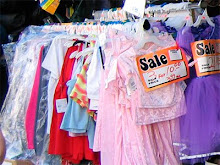
My Dad asked me last night to do some research for him about salt. Is it good for you? Is it bad for you? How much should you eat? I think that Herman Aihara gives a good answer in his book, Basic Macrobiotics. In his chapter, "Sea Vegetables and Salt," he says:
"Salt has had so much bad press lately that many people are now under the impression that it is harmful to the human body in any amount. In reality, we cannot live without a small, but crucial, amount of salt. All red-blooded animals must have a continual supply of the essential elements salt naturally contains in order to maintain a strong and healthy condition."
He goes on to talk about the dangers of today's common refined salt that has been heated in temperatures as high as 1,200 degrees Fahrenheit, which is high enough to alter salt's chemical structure. "This structural change of salt is one of the reasons that degenerative diseases, such as heart disease and arthritis, have become so prevalent in this country."
"Many people consume large quantities of animal food, which contains relatively high amounts of naturally occurring sodium. Those who eat animal foods frequently should greatly restrict other sources of salt, but seldom do. However, those who don't eat many of these foods need to be sure that they have a good source of high-quality salt."
What is high-quality salt?
Mr. Aihara goes on to say, "The common table salt commercially available today is purified sodium chloride, or NaCl, with dextrose sugar and an anti-caking agent, usually a silicate, added. Natural sea salt is also mostly NaCl. However, the big difference is that it still contains about 4 percent of various minerals, which are extremely important for body function and development. This is a serious matter today because the minerals in topsoil, and thus food, are being depleted by commercial farming techniques, in which farmers no longer cooperate with nature."
He then provides his recommendations for a more balanced macrobiotic use of salt, including the reasons for not eating plain or raw salt at the table and directions for making gomashio, a table condiment containing roasted sesame seeds and natural sea salt.— see pages 131-142, Basic Macrobiotics, by Herman Aihara
Notes:
• Eden Foods provides a selection of condiments, such as natural unrefined sea salts as well as organic gomashio (also spelled "gomasio").
• Selina Naturally (The Grain & Salt Society) provides a selection of salts, including unrefined, finely ground Celtic sea salt.
• You can get the book, Basic Macrobiotics, by Herman Aihara at the George Ohsawa Macrobiotic Foundation website.






















































